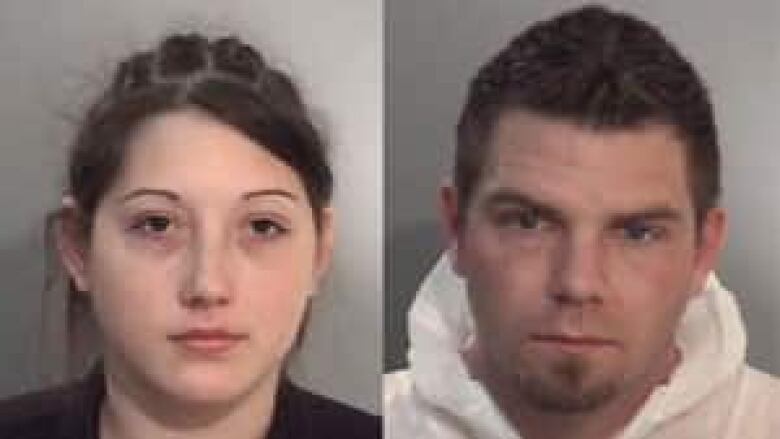Tori Stafford jury to resume deliberations
WARNING: This story contains disturbing details
Jurors will resume deliberations today over the fate of Michael Rafferty, the man accused of raping and killing eight-year-old Victoria (Tori) Stafford, after the judge issued his final charge Thursday in a London, Ont., courtroom.
Rafferty, 31, has been charged with first-degree murder, sexual assault causing bodily harm and kidnapping. He has pleaded not guilty. A conviction on the first-degree murder charge would carry a life sentence in prison with no chance of parole for 25 years.
The jury was sequestered Thursday evening. The nine women and three men on the jury are set to resume deliberations Friday morning.
Tori disappeared on her way home from Oliver Stephens Public School in Woodstock, Ont., on the afternoon of April 8, 2009. Her partially clothed remains were found more than three months later.
Justice Thomas Heeney told jurors they could find Rafferty guilty or not guilty for sexual assault or kidnapping. However, there are several options when returning a verdict on the murder charge, due in large part to Terri-Lynne McClintic. Two years ago, the 21-year-old pleaded guilty to killing Tori.

In March, she testified that she hit the Grade 3 student in the head with a hammer after witnessing Rafferty sexually assault Tori. However, until January of this year she maintained that Rafferty killed the girl and jurors were shown a May 24, 2009, interview with police during which she said just that.
Heeney laid out a number of possible scenarios, involving Rafferty or McClintic delivering the fatal blows, which could result in a conviction on manslaughter, second-degree or first-degree murder. The jury could also return a not guilty verdict.
Jury must 'rise above emotional considerations'
The judge told jurors they must base their decision on the evidence and not emotion.
"Deciding the facts is your job, not mine," Justice Heeney said.
To do that, Heeney said, jurors must disregard any feelings they may have towards Tori, including any emotional reaction to gruesome autopsy photos of the girl's remains that were shown in court earlier in the trial.

"It is your duty to rise above emotional consideration and dispassionately decide this case based solely on the evidence and the law as I describe it to you," Heeney said.
The judge also urged jurors to disregard any information they may have gleaned from media reports.
Rafferty's character is 'irrelevant'
Heeney said he would provide the 12 jurors with an understanding of the relevant legal concepts before they began their deliberations, including that any person charged with a crime is presumed innocent and it is the Crown's job to prove guilt beyond a reasonable doubt.
He also reviewed the evidence presented over the last 10 weeks, including a portion of the information provided by the 62 witnesses and nearly 200 exhibits.
The judge focused on the testimony provided by McClintic, the Crown's key witness. She is serving a life sentence after pleading guilty to the first-degree murder of Tori.
In March, McClintic testified she lured Tori to Rafferty's car on his orders. The pair then drove the girl to Guelph and later to Mount Forest, 100 kilometres north of Woodstock, where, according to McClintic, Rafferty raped the young girl.
The sexual assault sent McClintic into a rage and she killed Tori by hitting her head with a hammer, she said. The pair then buried the body under a number of rocks.
The judge also touched on the testimony provided by more than a dozen women who dated Rafferty during the spring of 2009. Heeney told jurors it is what the women said that is important, not the number of women he met with.
"His character is irrelevant in your consideration," Heeney said.
Rodney Stafford, Tori's father, told CBC's Connect with Mark Kelley that he was glad he sat through the lengthy trial.
"But there was days, I had to take days off," he said after the jury had been sequestered Thursday. "I couldn't sit and listen to the pain and torture that Victoria went through. To have to relive that, multiple times, it's just horrible, and I don't want to have to live through it again."
Trial began on March 5
Defence lawyer Dirk Derstine spoke to reporters outside the courthouse Thursday, saying the Crown's case relies heavily on the testimony of McClintic, which he said had significant holes.

"She has changed her story in an overwhelming way," Derstine said, adding it will be up to the jury to determine what happened.
Derstine told the media that he could not comment on Rafferty's mindset, but did say that "literally the rest of his life is before him."
The Crown contends Rafferty was the mastermind behind the abduction so he and McClintic are responsible for Tori's death.
The defence, however, has suggested that Rafferty was merely a horrified spectator and that McClintic was the "engine" behind the events of April 8, 2009.
Derstine put a number of propositions to McClintic during her cross-examination in March, alleging she abducted Tori for a drug debt and offered the girl to Rafferty as a sexual gift, which Rafferty rejected. She then killed the girl unbeknowst to him.
McClintic rejected all of those suggestions and the judge told the jury that accordingly they could not accept it as evidence and it ought not to play a role in their deliberations.
Rafferty’s trial began on March 5.